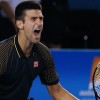By Randy Walker
@TennisPublisher
“Novak Djokovic…Aussie! Aussie! Aussie! An historic three-peat,” was the match point television call by ESPN’s Chris Fowler as world No. 1 Djokovic became the first man to win three straight Australian Open singles titles since the Open Era began in Australia in 1969 with a 6-7 (2), 7-6 (3), 6-3, 6-2 win over Andy Murray.
Djokovic’s title was his fourth overall Australian title, equaling him with other four-time Australian champs Andre Agassi, Roger Federer, Jack Crawford and Ken Rosewall. Only Roy Emerson, who won six Aussie titles from 1961 to 1967, won more men’s singles titles Down Under than Djokovic. Emerson was the last man to win three Australian titles when he won the last of his five straight titles in 1967.
After winning the first set tie-breaker 7-2, Murray held a 0-40 advantage of Djokovic’s serve in the first game of the second set, but was unable to convert. Patrick McEnroe, commentating for ESPN, called Murray’s inability to break Djokovic at this point as a major turning point in the match.
“Novak Djokovic was absolutely on the ropes,” said McEnroe of Djokovic at that point in the match. “That 0-40 game was crucial. Novak was rattled.”
Both players easily held serve to again reach a tie-breaker where a freak incident when a feather falling from a seagull help cause Murray to lose the set. Serving at 2-2 and after missing his first serve, Murray stopped his motion as he noticed the feather fall to earth. He walked to remove the object, then double-faulted to give Djokovic a mini-break lead at 3-2 in the tie-breaker. Djokovic then took hold of the momentum and rolled through to win 7-3.
It was not until two hours and 52 minutes into the match when the first service break occurred, Djokovic winning the eighth game of the third set, the thirty-second service game of the match. Djokovic opened the game winning a 36-shot rally, that seemingly took the gas out of Murray for the rest of the game.
Djokovic then served out the set the next game and with the two-sets-to-one lead, turned the screws as Murray appeared in pain, suffering from blister problems on his right foot. Djokovic did not drop serve the entire match and won 35 of 41 points when he approached the net, perhaps the key statistic of the match.
Djokovic’s win was played in two hours and 13 minutes less time than it took for him to beat Rafael Nadal in the 2012 Australian Open final in five hours, 53 minutes, the longest major singles final in history. The Djokovic-Nadal match from 2012 was named the No. 7 match of all-time by author Steve Flink in his book THE GREATEST TENNIS MATCHES OF ALL TIME, available here: http://www.amazon.com/The-Greatest-Tennis-Matches-Time/dp/0942257936/ref=sr_1_2?ie=UTF8&qid=1359292891&sr=8-2&keywords=The+Greatest+tennis+matches+of+all+time
Djokovic’s sixth major singles title – adding in his Wimbledon and US Open titles from 2011 – move him to a tie for 21st place all time alongside all-time greats Don Budge, Boris Becker, Stefan Edberg, Jack Crawford, Tony Wilding and Laurie Doherty, as documented in THE BUD COLLINS HISTORY OF TENNIS (available here: http://www.amazon.com/The-Collins-History-Tennis-Authoritative/dp/0942257707/ref=sr_1_1?ie=UTF8&qid=1359293893&sr=8-1&keywords=bud+collins+history+of+tennis)
With seven-time French Open champion Nadal off the tour for seven months with what he says are knee problems, Djokovic will no doubt be focusing his attention and goals toward winning the French Championships in June, the only major tournament missing from his resume. A victory in Paris, would give Djokovic the distinction of being only the seventh man in tennis history to win a “Career Grand Slam” – joining Federer, Nadal, Budge, Emerson, Rod Laver and Fred Perry.

